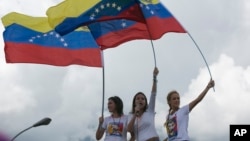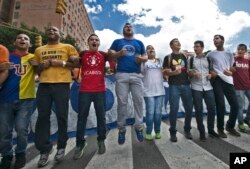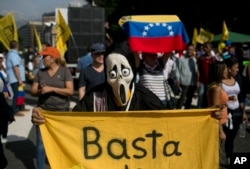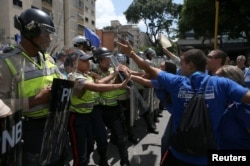When he received a call saying he had won a mobile phone, Gilberto Sojo, a low-income bank messenger and opposition activist, rushed off happily to collect it.
The call was a ruse.
Minutes after reaching the shop, three men turned up and bundled Sojo, then 49, and his wife into a waiting car where he was handcuffed and driven to the headquarters of Venezuela's intelligence service, according to his family and supporters.
"They placed explosive materials on his motorbike — and accused him of terrorism," his wife Carolina Gonzalez, 43, said at a community center in a poor neighborhood of Caracas, over a hill from the prison where her husband has been held since November 2014.
Sojo, whose case has still not gone to trial, is one of the least-known of a hundred or so opponents of President Nicolas Maduro detained on accusations or formal charges of plotting to overthrow his socialist government.
Their fate is high on the agenda of Vatican-brokered talks between the government and opposition, intended to halt unrest and prevent further bloodshed in a deeply divided country in the midst of a crippling recession.
Though the monthlong talks have been faltering, several of the detainees — whom the opposition call political prisoners but Maduro says are coup-plotters and criminals — were released as early goodwill gestures around Pope Francis' initiative.
But the opposition is demanding freedom for all, raising families' hopes.
"None of them should be there in the first place. They use the prisoners as hostages, bargaining chips," said Adriana Pichardo, a legislator and rights spokeswoman for the hardline Popular Will party whose members have taken the brunt of arrests. "It was never this bad under Chavez."
The charismatic Hugo Chavez ruled Venezuela between 1999 and 2013 with a firm hand, driving some opponents into exile and jailing others. But Maduro, 53, a weaker leader facing a more popular opposition, has far surpassed him.
Thousands detained since 2014
Local rights group Penal Forum lists 108 political prisoners currently, up from 11 when Maduro was elected president following Chavez's death from cancer in 2013. The opposition coalition puts the current number higher, at 135.
In the last two years, there have been 6,811 politically-motivated detentions, though most of those were short-term and spiked during a wave of anti-Maduro protests in 2014, according to Penal Forum, which tracks cases and offers free legal assistance.
The accusations range from stashing arms and explosives, to inciting violence and hate via Twitter and political ads.
Sojo, his wife said, was accused of planning to set off a bomb at a Caracas court to free Popular Will leader Leopoldo Lopez, Venezuela's best-known prisoner, during his trial.
"It's lies. His real crime was supporting the opposition. The 'Chavistas' never forgave him," she added, saying Sojo backed Chavez for several years before becoming disillusioned.
He began helping the opposition organize community activities in his San Agustin neighborhood and eventually joined the Popular Will party, meeting Lopez on several occasions.
In jail, Sojo has been beaten, insulted and even hung "Christ-like" from chains, his wife said, though treatment improved when he was named a substitute legislator after a vote last year gave the opposition control of the National Assembly.
Some radical Maduro opponents do operate a self-styled "Resistance" movement and advocate violent methods as the only way to free Venezuela from what they say is a dictatorship.
And some current opposition leaders backed a short 2002 coup against Chavez.
Officials frequently take to TV and Twitter to display weapons, explosives and inflammatory communications, to show a cadre of hotheads are perpetrating crimes that would land them in jail anywhere.
"There is not one prisoner of conscience here," said Jorge Valero, the government envoy to the United Nations in Geneva who frequently defends Venezuela's rights record there.
Lawyer's nightmare
Tear gas was still wafting through the narrow streets around his apartment in Caracas' Chacao district, an epicenter of anti-Maduro protests and clashes, when middle-class lawyer Marcelo Crovato's phone went off at 4 a.m. on April 22, 2014.
It was a neighbor, the local laundry owner, with police at his door beginning a search.
Crovato, who has Argentine as well as Venezuelan nationality, had been defending protesters in court for a couple of months and sprung out to help his neighbor, his family says.
But as he accompanied his client to the police station, he was also detained, accused of instigating crimes during the protests that year that left 43 dead and thousands injured.
"We presume it is retaliation against the lawyers who defended the youths," said his wife Elky Arellano, 49, as Crovato sat in the background, forbidden from speaking to reporters under the terms of his house arrest.
Crovato, 50, spent 10 months at a prison where, ironically, he had once served as director. That made him a potential target for inmates, but he won protection by giving free legal advice.
Now back home, he whiles away the time playing with his two young sons and sewing bags to sell. He cannot continue his legal defense work because he is unable to attend tribunals.
"This is his prison now," Arellano said, gesturing at their view of a wall through the living-room window.
Crovato, like Sojo and scores of others, is hoping opposition and international pressure will lead to his freedom one day soon. But rights campaigners are skeptical.
Of 53 new detainees in 2016 on Penal Forum's list of political prisoners, 49 were taken after former government leaders from Spain, Panama and the Dominican Republic began promoting talks in May, the rights group said.
"They free some, but they've already taken more, so where is the gain?" Penal Forum director Alfredo Romero said. "That's their game."








